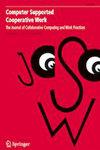A Multi-view Knowledge Graph Embedding Model Considering Structure and Semantics
IF 2
3区 计算机科学
Q3 COMPUTER SCIENCE, INTERDISCIPLINARY APPLICATIONS
Computer Supported Cooperative Work-The Journal of Collaborative Computing
Pub Date : 2023-05-24
DOI:10.1109/CSCWD57460.2023.10152719
引用次数: 0
Abstract
The essence of knowledge representation learning is to embed the knowledge graph into a low-dimensional vector space to make knowledge computable and deductible. Semantic indiscriminate knowledge representation models usually focus more on the scalability on real world knowledge graphs. They assume that the vector representations of entities and relations are consistent in any semantic environment. Semantic discriminate knowledge representation models focus more on precision. They assume that the vector representations should depend on the specific semantic environment. However, both the two kinds only consider knowledge embedding in semantic space, ignoring the rich features of network structure contained between triplet entities. The MulSS model proposed in this paper is a joint embedding learning method across network structure space and semantic space. By synchronizing the Deepwalk network representation learning method into the semantic indiscriminate model TransE, MulSS achieves better performance than TransE and some semantic discriminate knowledge representation models on triplet classification task. This shows that it is of great significance to extend knowledge representation learning from the single semantic space to the network structure and semantic joint space.一种考虑结构和语义的多视图知识图嵌入模型
知识表示学习的本质是将知识图嵌入到低维向量空间中,使知识可计算、可演绎。语义不加区分的知识表示模型通常更关注现实世界知识图的可扩展性。它们假定实体和关系的向量表示在任何语义环境中都是一致的。语义区分知识表示模型更注重准确性。他们假设向量表示应该依赖于特定的语义环境。然而,这两种方法都只考虑了语义空间中的知识嵌入,而忽略了三元实体之间包含的网络结构的丰富特征。本文提出的MulSS模型是一种跨网络结构空间和语义空间的联合嵌入学习方法。通过将Deepwalk网络表示学习方法同步到语义不区分模型TransE中,MulSS在三元组分类任务上取得了比TransE和一些语义区分知识表示模型更好的性能。这表明将知识表示学习从单一的语义空间扩展到网络结构和语义连接空间具有重要意义。
本文章由计算机程序翻译,如有差异,请以英文原文为准。
求助全文
约1分钟内获得全文
求助全文
来源期刊

Computer Supported Cooperative Work-The Journal of Collaborative Computing
COMPUTER SCIENCE, INTERDISCIPLINARY APPLICATIONS-
CiteScore
6.40
自引率
4.20%
发文量
31
审稿时长
>12 weeks
期刊介绍:
Computer Supported Cooperative Work (CSCW): The Journal of Collaborative Computing and Work Practices is devoted to innovative research in computer-supported cooperative work (CSCW). It provides an interdisciplinary and international forum for the debate and exchange of ideas concerning theoretical, practical, technical, and social issues in CSCW.
The CSCW Journal arose in response to the growing interest in the design, implementation and use of technical systems (including computing, information, and communications technologies) which support people working cooperatively, and its scope remains to encompass the multifarious aspects of research within CSCW and related areas.
The CSCW Journal focuses on research oriented towards the development of collaborative computing technologies on the basis of studies of actual cooperative work practices (where ‘work’ is used in the wider sense). That is, it welcomes in particular submissions that (a) report on findings from ethnographic or similar kinds of in-depth fieldwork of work practices with a view to their technological implications, (b) report on empirical evaluations of the use of extant or novel technical solutions under real-world conditions, and/or (c) develop technical or conceptual frameworks for practice-oriented computing research based on previous fieldwork and evaluations.
 求助内容:
求助内容: 应助结果提醒方式:
应助结果提醒方式:


